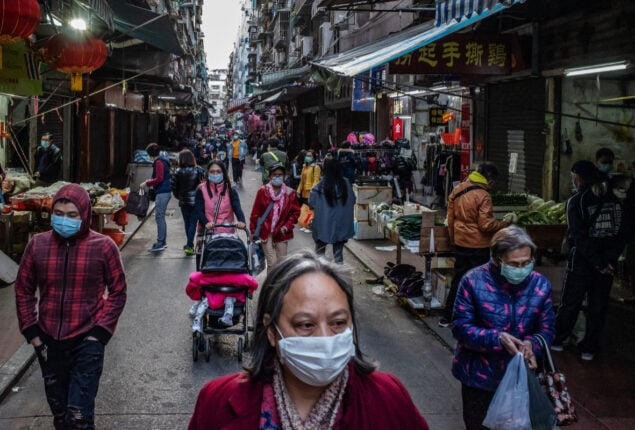Chinese-Canadian singer Kris Wu received a 13-year sentence for sex offences
Kris Wu, a Chinese-Canadian pop artist, was found guilty of sex offences...

China Covid: WHO demands China’s Covid data
Thousands of people demonstrated against restrictions and remembered the victims on Shanghai’s streets. There were numerous cries for President Xi Jinping to step down.
At least three persons were observed being loaded into police cars.
The mortality toll from the fire has been attributed to the lockdown of apartment buildings.
Chinese authorities dispute that it was the reason, although late on Friday, Urumqi officials did issue an extraordinary apology and promised to “establish order” by gradually removing restrictions.
Some protesters were seen burning candles and placing flowers for the victims at the demonstration in Shanghai, China’s largest metropolis and a major financial centre.
Slogans like “Xi Jinping, step down” and “Communist party, step down” could be heard being shouted by others. Others had white flags that were empty.
Such demands are uncommon in China, where criticising the president or the administration directly can result in severe repercussions.
One demonstrator said he was “shocked and a little excited” to see people on the streets and that it was the first time he had witnessed such widespread discontent in China.
He claimed that lockdowns had prevented him from visiting his ill mother, who was receiving cancer treatment, and had left him feeling “sad, furious, and helpless.”
When asked how they felt about the protests, police officers said, “The same as you,” a female protester claimed. But they “wear their uniforms so they’re doing their job,” she added.
A demonstrator told the news agency Associated Press that two of his friends had been pepper sprayed, and that one of his friends had been physically assaulted by police there.
Several dozen police officers, private security guards, and plain-clothed police officers were present in the demonstration area, despite the fact that the situation had cooled down by Sunday AM.
Online images and videos from other Chinese campuses show students protesting on Saturday night. It appeared that Nanjing Communications University hosted the largest crowd.
Although it is challenging to independently verify demonstration videos, several of them exhibit extremely frank and direct criticism of the government and its leader.
According to several sources, the Urumqi fire represented a worst-case scenario for many Chinese people who have recently been subject to numerous restrictions: being confined to one’s flat with no means of escape. Authorities have denied this, but that hasn’t stopped the people from becoming outraged and alarmed.
It has now reached the most recent breaking point in the rising frustration. Millions have grown weary of regular Covid testing and movement limitations over the past three years. All areas of China are seeing the outpouring of rage, from major cities to remote areas like Xinjiang and Tibet. Young university students, manufacturing employees, and regular citizens are among those who have been affected.
Protests against Covid policies have increased in frequency as this rage rises. But even this weekend’s protests are out of the ordinary in this new normal, both in terms of their size and the candour with which they criticised the leadership and President Xi Jinping.
Not so long ago, it was considered inconceivable that hundreds of people would take to the streets to demand President Xi’s resignation. But with a recent shockingly dramatic protest on a bridge in Beijing, a standard seems to have been set for the expression of more outspoken and acerbic opposition.
Others have choose to wave the Chinese flag and sing the national anthem, whose lyrics encourage the populace to “stand up, rise up” and espouse revolutionary ideas. It’s a display of patriotism that might potentially be interpreted as a strong statement of support for fellow Chinese who are suffering as a result of Mr. Xi’s zero-Covid policy as well as a call to action.
The demonstrations are the most recent in a growing string of protests against China’s zero-Covid policies that have also grown more outspoken in their criticism of the administration and President Xi.
Due in part to China’s relatively low vaccination rates and efforts to safeguard the elderly, the zero-Covid plan is the last of its sort among the major economies of the world.
Snap lockdowns have angered people all around the nation, and more general Covid restrictions have sparked recent violent protests from Zhengzhou to Guangzhou.
China’s case numbers this week reached all-time highs since the pandemic started, despite the strict measures.
Catch all the International News, Breaking News Event and Latest News Updates on The BOL News
Download The BOL News App to get the Daily News Update & Follow us on Google News.